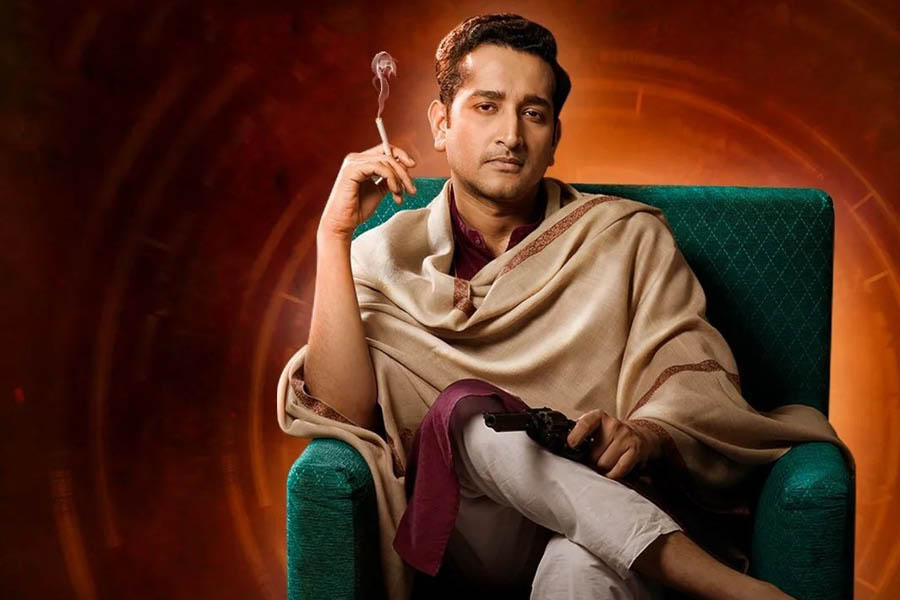For the greater part of the first couple of episodes of Shabash Feluda: Gangtok-e Gondogol, I kept wondering. Had the cynic in me, the sceptic, become inured to the assembly-line detective films and web series coming out of Bengal? Had my weary spirit reconciled to the inevitability of the Feludas and the Byomkeshes, and the futility of being critical of these ‘products’ (for most of these are not creative works by any stretch of imagination), to the extent that it had rebelled and was telling me ‘endure what cannot be cured’? Or, was I really enjoying what was unfolding before me? Could there really be a way back for Feluda after the deadeningly soporific Hatyapuri late last year?
On the evidence of Arindam Sil’s new web series, dare I say, yes? There is something rather quaintly charming about Gangtok-e Gondogol. Is it that in Parambrata Chattopadhyay’s (the only actor to have played both Topshe and Feluda) portrayal there is none of the harking back to Soumitra Chatterjee we have seen in most visual adaptations of Satyajit Ray’s beloved sleuth? Most actors essaying the role over the last 15-odd years, barring Abir Chatterjee, appear so overwrought about the prospect of playing Feluda the Soumitra Chatterjee way that one can almost see them forgetting to breathe. And the lesser said about the renditions of Lalmohan Ganguly the better.
It helps that Arindam Sil makes certain clear breaks from these established modes. In many ways, he is probably the best bet to have given the detective a fresh take. His adaptations of three Byomkesh Bakshi stories are a case in point where, while remaining faithful to the original, Sil added his own touches, not least of all in the way he made the locations an integral part of the narrative. So, Patna of ‘Banhi-Patanga’ becomes a very evocative Benares in Har Har Byomkesh. Shifting the location of Byomkesh Gowtro to Mussoorie adds layers both in terms of the narrative and the locale.
In these endeavours he was immensely helped by Bickram Ghosh’s innovative background music that evokes the filmmaker’s vision. Sil’s Shobor movies too – Eagoler Chokh and Asche Abaar Shobor – gave a sassy detective to Bengali cinema. With Gangtok-e Gondogol, Sil emerges from a relatively poor patch that had him helm the underwhelming Byomkesh Hotyamancha and Tirandaj Shobor.
Rudranil Ghosh’s Nishikanto Sarkar becomes the beating heart of the series
Gangtok-e Gondogol is one of the early Feluda cases – the fifth story involving the detective and the second novel. When Ray wrote the novel in 1970, Sikkim was not yet a part of the Indian union, and setting the film in contemporary times is one of the major changes that the filmmakers make. So you have references to China, Doklam and other geopolitical aspects woven into the screenplay. You also have modern technology playing an important role – and intelligently so, as a telegram message in the original becomes a WhatsApp one here – though Feluda does chide Topshe about the obsession with selfies and Instagram. The internet too comes to the rescue in the absence of Sidhu Jyatha (though he does make a guest appearance, as Feluda reminds us that what Google search cannot provide, Sidhu Jyatha can).
There are intelligent additions to the story – including the no-nonsense, unsmiling woman cop Rinchen Ganpo, played remarkably well by Sauraseni Maitra. But by far the most interesting change the filmmakers make lies in the way Nishikanto Sarkar, one of the great side characters in the Feluda universe, sadly unknown, plays out. Gangtok-e Gondogol came out a year before Sonar Kella, which introduced the memorable Lalmohan Ganguly aka Jatayu.
Padmanabha Dasgupta, the writer, and Sil make the rather audacious decision to cast Nishikanto in the Jatayu mould. And in Rudranil Ghosh they have an actor who delivers big time. It is Rudranil, with almost a near-perfect rendition of a Bengali’s ham-handed way of speaking Hindi, who becomes with each episode the beating heart of the series and keeps it watchable even as the narrative slackens in places. What adds to the portrayal are the character’s dark shades which Lalmohan babu does not have. It’s a delightful performance.
Padmanabha Dasgupta’s writing and the lead performances seal the deal
It is in Padmanabha’s writing and the lead performances – particularly Rudranil, Sauraseni and Parambrata (in a well-calibrated portrayal, probably the best Feluda if you leave out Soumitra) – that the series scores and becomes materially different from other recent Feluda outings. There’s of course Ritwick Chakraborty, who can probably give a lamp-post a different dimension if he were to be cast as one. Then there’s Bickram Ghosh’s music, and like in almost all his collaborations with Sil, the music is an integral part of the narrative. What’s most heartening about the background score here is the way it steers clear of all Satyajit Ray influences and becomes something new altogether.
This is not to say that all is well with the Feluda universe. At close to five hours’ runtime spread over 10 episodes, it is a bit of a stretch. And the flab shows at times. There are the obvious, and often irritating, references to the Satyajit Ray and Sukumar Ray canon (‘Kolkata, Diamond Harbour, Ranaghat Tibbat’, for example, exists only because it is a memorable phrase of Bengali literature, or Nishikanto underlining ‘highly suspicious’ aka Jatayu in Sonar Kella). Also, the group of goons led by Mohandas Mehta (Kamaleswar Mukherjee) simply do not come up to scratch.
But these are minor quibbles in a series I enjoyed for the most part and that frees Feluda from the tyranny of adhering to the established norms. Now, if only the filmmakers show the nerve for something developing between Feluda and Rinchen Ganpo. Ah!
(Shantanu Ray Chaudhuri is a film and music buff, editor, publisher, film critic and writer)











